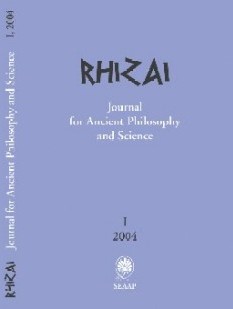Aristotle’s Account of the Origins of Philosophy
Aristotle’s Account of the Origins of Philosophy
Author(s): Michael FredeSubject(s): Philosophy
Published by: Издателство »Изток-Запад«
Keywords: wisdom; philosopher; four causes; first principles; God; metaphysics; dialectic; Book Alpha; Hesiod; Thales; Pythagoras; Heraclitus; Plato
Summary/Abstract: This paper investigates Aristotle’s account of the origins of philosophy in Met. A.3-10. To appreciate it as a guide to our understanding of the beginnings of philosophy, it is crucial to see that this account relies on the preceding account of wisdom understood as theoretical knowledge of things in terms of their principles and causes. Since there is a highest form of wisdom, which involves knowledge of the ultimate principles of what there is, there is also a philosophy which aims at this sort of knowledge, that is philosophy in the primary sense of the word, i.e. metaphysics. Aristotle’s account in Met. A 3-10, the paper claims, is an introduction into such philosophy. The primary aim of the account is to show that philosophy is indeed a matter of explaining things in terms of principles or causes, of which there are exactly four types. Aristotle’s account of the origins of philosophy is thus a story of the progressive discovery of these four types of explanation, starting with Thales’ use of explanation in terms of matter. The crucial development in this story comes with the insight that reality is not exhausted by the sensible world, more specifically that there are immaterial substances which make the sensible world intelligible, which necessitated explanation in terms of form and purpose.
Journal: Rhizai. A Journal for Ancient Philosophy and Science
- Issue Year: I/2004
- Issue No: 1
- Page Range: 9-44
- Page Count: 36
- Language: English
- Content File-PDF

